|
 Secure Site
Secure Site
|
 |
Archive for the 'Zen Timers' Category
Research published in the last two years shows that certain slow activities–like gentle yoga or gardening–can reduce your stress level and blood pressure and improve your body’s ability to regulate sugar. Past studies have shown that other habits like meditation can help reduce chronic pain and enhance mental clarity. The first step to finding “slowness”is to clear some room in your life–watch less TV or spend less time browsing at the mall. “Jettison the clutter that clogs up your schedule,” says Carl Honoré, author of In Praise of Slowness (HarperOne, 2004). “When you focus on the things that are important at work or at home you can enjoy those things more,”he says. You can also take a more relaxed approach to the things you already do and adopt new habits that require mindfulness. “It’s one thing to say you’re going to slow down, but a slow hobby helps you put those words into practice,” says Honoré. To get you started we’ve come up with seven ways to destress and reenergize.
 gardening is a great mindfulness practice that cultivates stillness of mind 1. Become a Gardener
Caring for flowering plants may help you relax and get grounded. In 2004, researchers at Japan’s Utsunomiya University found repotting plants lowered fatigue and promoted physiological relaxation in study participants, and that working with flowers seemed to have a stronger positive effect than working with nonflowering plants.
HEALTH BENEFITS Research shows that exposure to plants–and even just looking at them–can reduce blood pressure, increase concentration and productivity, and help you recover from illness, says Andy Kaufman, Ph.D., assistant professor of tropical plant and soil sciences at the University of Hawaii in Honolulu. He cites a classic 1984 study, published in Science, which showed that even the view of a green garden helped surgical patients recovering from gall bladder surgery. Among a group of 46 patients in a Pennsylvania hospital, the 23 who had rooms with windows facing greenery had shorter postoperative stays and needed fewer pain–relieving analgesics than the 23 whose windows faced a brick wall.
GETTING STARTED If you live in an apartment or don’t have much room to garden, invest in the EarthBox (earthbox.com), a self–watering container garden that comes with potting soil and fertilizer. “Even if you have a brown thumb, you can grow things [in it],”says David Ellis, American Horticulture Society spokesperson. You could also join a community garden; visit ahs.org, the American Horticulture Society’s website, for more info.
 yoga helps to slow us down 2. Practice Slow Yoga
Slow yoga emphasizes one drawn–out breath for each movement you make. Like tai chi, it uses many repetitive flowing moves. “When you practice slow yoga, you create more awareness between mind and body,”says Beth Shaw, founder of Yoga Fit Training Systems in Los Angeles. This creates a deep sense of stillness and helps develop patience and lower stress, she adds.
HEALTH BENEFITS Last year, researchers in Sweden and India showed that practicing yoga can reverse the negative effects of high blood pressure, obesity, and high blood sugar. The studies, published in the journal Diabetes Research and Clinical Practice, showed reduced waist circumference, blood pressure, blood sugar, and triglycerides (the chemical form of fat cells) and higher HDL (so–called good cholesterol) levels in a control group that practiced yoga versus a placebo group.
GETTING STARTED To find a Slow Yoga class near you visit yogafit.com or inquire at your local yoga studio. You might also consider restorative or yin yoga, two other gentle forms of the practice.
 Take a nap 3. Take a Nap
You snooze, you win, according to a Harvard study published last year in The Archives of Internal Medicine. Researchers revealed that people who regularly napped at least three times a week for an average of 30 minutes had a 37 percent lower risk of heart attack than those who didn’t nap. “It shows that napping is an important preventive strategy just like regular exercise, eating right, and not smoking,”says Sara C. Mednick, Ph.D., author of Take a Nap! Change Your Life (Workman, 2006).
HEALTH BENEFITS A daily nap also boosts serotonin, says Mednick, which may lead to improved memory and performance. Napping can even contribute to weight loss, according to a study in the American Journal of Physiology, Endocrinology, and Metabolism in 2007. That study looked at hormone levels in 41 men and women who were part of a seven–day sleep–deprivation experiment. Those allowed to nap for two hours following a night without any sleep showed a significant drop in cortisol, a hormone related to high levels of stress, and a complement of growth hormone, which helps regulate insulin and fat storage. Researchers concluded that a midafternoon nap improves alertness and performance and reverses the negative metabolic effects of sleep loss.
GETTING STARTED The best time to nap is between 1 p.m. and 3 p.m., but a 15– to 20–minute power nap at any time can help. Set your Zen Alarm Clock for 20 minutes. Close the office door and take a snooze, or find a quiet place where you feel safe. Nap on weekends, Mednick says. “Just don’t use the weekend to catch up on sleep lost in the week.”Check with your doctor about napping if you’re being treated for insomnia.
4. Start a Slow Hobby
 learning to paint Hobbies that require mindful, solitary activity–such as knitting, painting, sculpting, crocheting, or quilting–can act as a brake on your hectic pace.
HEALTH BENEFITS “Slow hobbies help you cultivate the lost art of concentration and being in the moment. They have a meditative quality to them,”says author Carl Honorè. “And that calming effect goes beyond the act itself. Maintaining that inner stillness enables you to negotiate the fast–moving waters of the rest of your day.”
GETTING STARTED Sixty–four percent of people who knit or crochet say they use these crafts to help them reduce stress and relax, according to the Craft Yarn Council of America. Visit craftyarncouncil.com for information. To learn about drawing, visit drawspace.com. Check with a local college or community center for other craft classes.
5. Eat Slowly
Eating too fast creates stress in the body, says nutritionist Marc David, author of The Slow Down Diet (Healing Arts Press, 2005). That causes a spike in cortisol and insulin, which in turn diminishes your ability to burn calories and makes you more likely to gain weight. Eating quickly also leads to overeating. “The brain demands more food if it doesn’t have time to register its needs for taste, aroma, and satisfaction,”says David.
HEALTH BENEFITS Taking time to eat creates a relaxation response, which means you’ll have fewer digestive complaints and your body will be able to take in the nutrients it needs. Plus “we make better food choices, and we know when to stop,”he adds.
GETTING STARTED To ease the pace, double the time you spend on your meals; for example, if you usually eat breakfast in five minutes, stretch it out to ten. “Focus on your food: Taste it, enjoy it, notice it, savor it,”says David. “Find relaxed time between bites by slowing down your internal conversation. Let go of any sense of urgency, and allow the moment to be sensual.”The cooking process can help you slow down too, says David. “Instead of microwaving something, make a soup from scratch.”
6. Do One Thing at a Time
A lot of us believe we get more done by multitasking. But research at the University of Michigan published in the Journal of Experimental Psychology in 2001, shows the opposite is true. “If you concentrate on one task at a time, you get more done faster and make fewer mistakes,” says David E. Meyer, director of the Brain, Cognition, and Action Laboratory at the University of Michigan.
HEALTH BENEFITS Taking on chores one at a time reduces chronic stress and protects your short–term memory, which comes under fire if the brain is overtaxed.
GETTING STARTED To curb outside distractions and focus better, set aside time when you can concentrate on one activity from start to finish. For example, check e–mail once an hour and turn off your instant messaging; let your phone messages go to voice mail and only check them occasionally throughout the day.
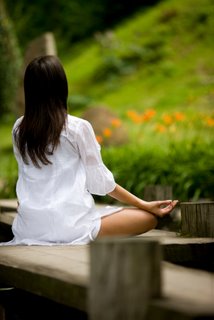 practice meditation in order to slow down 7. Meditate
“Meditation teaches us to focus,”says Steven Hartman, director of professional training at the Kripalu Health and Yoga Center (kripalu.org) in Stockbridge, Mass. “All day your mind is chattering. When you meditate, you can hear your own inner wisdom.”
HEALTH BENEFITS Studies have shown that practicing meditation also improves blood pressure, fortifies the immune system, and promotes a sense of well–being. “A daily meditation practice can bring body, breath, mind, and spirit into balance,”says Hartman.
GETTING STARTED Check out a program like Transcendental Meditation. (See tm.org.) Or begin at home: “Put an egg timer on and stay with your breath for just two and a half minutes,”says Hartman. “Keep your spine tall and straight and allow the breath to be natural.”If you’re seated on the floor, a cushion can raise your pelvis and bring your spine into a natural position. As you get comfortable with the practice, you can increase your time to 15 or 30 minutes a day.
adapted from Natural Health Magazine, by Chrystle Fiedler
One of the ultimate Zen like experiences is waking-up from a great slumber refreshed and energized. Your mind and body are harmoniously one, both alert and focused. Having a refreshed mind and body are two keys to a natural and Zen lifestyle. Waking up in the morning should not be a loud and abrupt awakening, but rather it should be a peaceful positive experience. The right natural alarm clock can transition your deep and tranquil sleep into a serene start to consciousness. Imagine a long-resonating Tibetan bell-like chime waking you up to a beautiful morning experience.
The right alarm clock can be the most beneficial investment for you. With our Now & Zen natural alarm clock you are awakened more gradually and thus more naturally. Now & Zen is focused on creating a naturalistic lifestyle, and our clocks are an example of our philosophy.
 Zen Meditation Timers with Soothing Chime Now & Zen – Soothing Chime Alarm Clock & Timer Store
1638 Pearl Street
Boulder, CO 80302
(800) 779-6383
Posted in Chime Alarm Clocks, intention, Meditation Timers, Meditation Tools, mindfulness practice, Natural Awakening, Now & Zen Alarm Clocks, sleep, Sleep Habits, wake up alarm clock, Well-being, yoga, Yoga Timer, Yoga Timers by Now & Zen, Zen Alarm Clock, Zen Timers
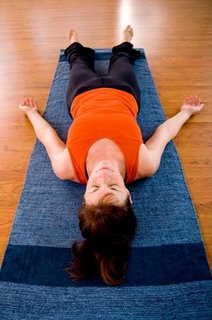 Yoga Pose 1. Lie down in the corpse pose and make yourself comfortable. Try a pillow under the head, and don’t forget a light blanket to keep drafts from drawing your attention outward.
2. Give yourself a few moments to settle, and allow your body to soften into the support of the ground. Watch the breath until it and your heart rate are steady.
3. Bring your awareness to each point listed below and allow the surrounding muscle tissues to relax.
Crown of the head
Forehead, temples
Eyebrows, eyelids, and eyes
Nose
(Focus on the breath flowing in and out of the nostrils, 2–4 times.)
Cheeks, jaw
Mouth, chin
Hollow of the throat
Sides and back of the neck
Shoulders
Upper arms, lower arms
Hands, fingers
Fingertips
(Inhale as if the breath is flowing down to the fingertips and exhale back up through the nostrils, 2–4 times)
Fingers, hands, arms
Shoulders
Chest and rib cage around the back to the spine
Heart center
(Inhale as if the breath is flowing down to the heart center and exhale back up through the nostrils, 2–4 times)
Abdomen
Sides, lower back
Hips, buttocks
Upper legs, lower legs
Feet
Toes
(Inhale as if the breath is flowing down to the toes and exhale back up through the nostrils, 2–4 times)
4. Reverse the sequence, bringing awareness up the body from the toes to the head without pausing for breath awareness at the toes, heart center, fingertips, or nose.
5. Take 10 breaths while keeping awareness spread throughout the body.
6. Make a gentle transition to your next activity.
Use our unique “Zen Clock” which functions as a Yoga & Meditation Timer. It features a long-resonating acoustic chime that brings your meditation or yoga session to a gradual close, preserving the environment of stillness while also acting as an effective time signal. Our Yoga Timer & Clock can be programmed to chime at the end of the meditation or yoga session or periodically throughout the session as a kind of sonic yantra. The beauty and functionality of the Zen Clock/Timer makes it a meditation tool that can actually help you “make time” for meditation in your life. Bring yourself back to balance.
adapted from Yoga International, Jan/Feb 2006 by Bran Cassidy
 Mediation Timers Now & Zen – The Zen Alarm Clock Store
1638 Pearl Street
Boulder, CO 80302
(800) 779-6383
Posted in intention, Meditation Timers, Meditation Tools, mindfulness practice, Zen Timers
“Mindfulness” is the spiritual practice of being aware of your present moment.
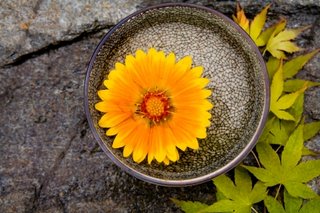 Take a moment to be still
World famous Zen monk Thich Nhat Hanh has developed the use of the bowl/gong in a practice he calls the “mindfulness bell.” When you hear the sound of the mindfulness bell, you are invited to take a moment to breathe in and out and center yourself in the present. During this practice, the resonating sound of the bowl/gong periodically connects you to the peace and tranquility that resides inside you right now. This delightful practice reduces stress and improves your overall health.
 Zen Enso
Zen Timepiece, Zen Alarm Clock and Digital Zen Alarm Clocks can serve as a mindfulness bell in two ways: it can be set to strike on the hour (providing an hourly moment of stillness), or it can be set to strike at a programmed interval, such as every twenty minutes, or even every three hours.
 Mindfulness Further Reading:
- Thich Nhat Hanh Peace is Every Step: The Path of Mindfulness in Everyday Life. Bantam Books 1992
- Tolle, Eckart The Power of Now. New World Library 1998
- Kabat-Zinn, Jon Wherever You Go There You Are: Mindfulness Meditation in Everyday Life. Hyperion Press 1995
- Fontana, David The Meditator’s Handbook: A comprehensive guide to Eastern and Western meditation techniques. Element, Inc. 1992.
- Brooke, Avery Learning and Teaching Christian Meditation. Cowley Publications 1990.
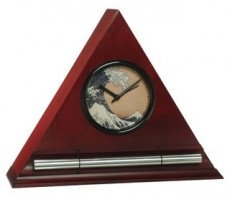 Hokusai Wave
Hokusai Wave
The Zen Alarm Clock is a consciousness-raising tool. No material object can actually raise your consciousness, but you can use information and devices such as this clock to stimulate your growth. The Zen Alarm Clock can effect your awareness in a variety of positive ways, all of which require your participation.
Use our unique “Zen Clock” which functions as a Yoga & Meditation Timer. It features a long-resonating acoustic chime that brings your meditation or yoga session to a gradual close, preserving the environment of stillness while also acting as an effective time signal. Our Yoga Timer & Clock can be programmed to chime at the end of the meditation or yoga session or periodically throughout the session as a kind of sonic yantra. The beauty and functionality of the Zen Clock/Timer makes it a meditation tool that can actually help you “make time” for meditation in your life. Bring yourself back to balance.
 Gradual Chime Clock Store and Meditation Timer Shop
Now & Zen – Meditation Timer and Gentle Chime Alarm Clock Store
1638 Pearl Street
Boulder, CO 80302
(800) 779-6383
Posted in Japanese Inspired Zen Clocks, Meditation Tools, Now & Zen Alarm Clocks, Zen Timepiece by Now & Zen, Zen Timers
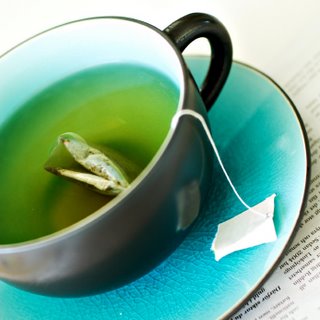 Green Tea for Heart Disease Start sipping your way to a stronger ticker. While heart disease is the biggest killer of women in the United States — nearly twice as many women die from heart disease and stroke than from all forms of cancer combined — a recent “Journal of the American Medical Association” report on green tea offers hope.
In 1994, researchers began studying a group of 40,530 Japanese adults (ages 40 to 79) with no history of stroke or heart disease. Following up with participants 11 years later, they discovered that women who drank five or more cups of the green elixir daily had a 31 percent lower risk of death from cardiovascular disease compared to those who drank less than one cup. (Tea-drinking men showed a 22 percent lower risk.) Can you still safeguard your heart without draining an entire kettle each day? According to lead study author Shinichi Kuriyama, M.D., Ph.D., drinking at least one cup daily would produce health benefits.
adapted from Body + Soul, 2007
“The Zen Alarm Clock & Chime Timer‘, uses soothing acoustic chimes that signal it’s time – gently and gradually.
Rather than an artificial recorded sound played through a speaker, the Zen Clock features an alloy chime bar similar to a wind chime. When the clock’s alarm is triggered, its chime produces a long-resonating, beautiful acoustic tone reminiscent of a temple gong.
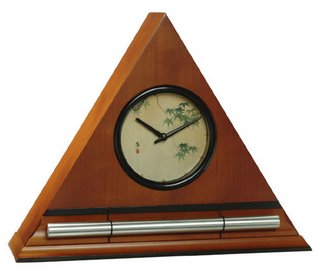 wake up alarm clocks with chimes Now & Zen – The Zen Timer Store
1638 Pearl Street
Boulder, CO 80302
(800) 779-6383
Posted in Now & Zen Alarm Clocks, zen, Zen Timers
 Natural Remeadies for the Winter Season Natural Remedies for the Winter Season.
A cup of tea made with ginger (Zingiber officinale) can help ease congestion and warm the body, which helps your system fight infection. Its anti-inflammatory properties make it a good sore-throat remedy, too.
How to use: Set your Zen Alarm Clock & Timer for 20 minutes. Simmer fresh or dried ginger for 20 minutes; strain and add a touch of honey and a squeeze of lemon, if desired. Incorporate ginger liberally into stir-fries and soups too!
adapted from Body + Soul Magazine, 2009
“The Zen Alarm Clock & Chime Timer‘, uses soothing acoustic chimes that signal it’s time – gently and gradually.
Rather than an artificial recorded sound played through a speaker, the Zen Clock features an alloy chime bar similar to a wind chime. When the clock’s alarm is triggered, its chime produces a long-resonating, beautiful acoustic tone reminiscent of a temple gong.
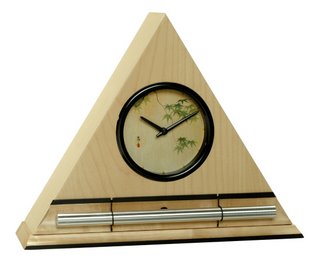 Zen Alarm Clock in Maple Finish with Maple Leaves Dial Face and Chime
Now & Zen – The Zen Timer Store
1638 Pearl Street
Boulder, CO 80302
(800) 779-6383
Posted in Well-being, Zen Timers
 Meditation Calms the Mind What It Does
Quiets your mind and hones your focus so you are fully present in this workout. Because the solar plexus is associated with the third chakra, you focus on the color yellow, which is linked to this energy center of the body and believed to inspire confidence, will, and personal power.
How to Do It
Lie back in Corpse pose, palms facing up. Picture a yellow flower, its petals fully open, at your solar plexus. With eyes closed, imagine it floating up with each inhalation and down with each exhalation, riding a slow, gentle wave. Set your Meditation Timer for 5 minutes. Focus on your breath and the flower for two to five minutes.
adapted from Body + Soul
Use our unique “Zen Clock” which functions as a Yoga & Meditation Timer. It features a long-resonating acoustic chime that brings your meditation or yoga session to a gradual close, preserving the environment of stillness while also acting as an effective time signal. Our Yoga Timer & Clock can be programmed to chime at the end of the meditation or yoga session or periodically throughout the session as a kind of sonic yantra. The beauty and functionality of the Zen Clock/Timer makes it a meditation tool that can actually help you “make time” for meditation in your life. Bring yourself back to balance.
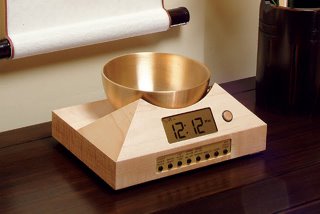 Tibetan Bowel Meditation Timers
Now & Zen – The Zen Meditation Timer and Alarm Clock Store
1638 Pearl Street
Boulder, CO 80302
(800 779-6383
Posted in intention, Meditation Timers, Meditation Tools, mindfulness practice, Well-being, yoga, Yoga Timer, Yoga Timers by Now & Zen, Zen Timers
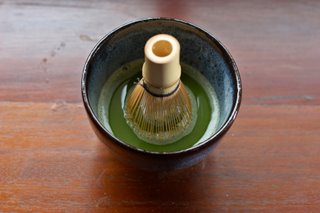 Timers for Tea Cermony Inspire your afternoon and refresh your senses by creating sacred space for a personal tea ceremony.
From the fragrant aromas to the delicate flavors to the simple comfort of a warm mug, tea is a meditation for the senses. It also creates space to unwind and reconnect.
Preparing it is a process, one that forces you to slow down and relax. “Tea is a gift from the earth,” says Diana Rosen, author of “Meditations With Tea,” “and enjoying it is a gift to yourself.”
By creating your own daily tea ritual in the afternoon when the day tends to drag, you can refresh your senses, refocus your thoughts, enjoy some peace, and — the best part — introduce a sacred moment into your day.
“The Zen Alarm Clock & Chime Timer’, uses soothing acoustic chimes that signal it’s time – gently and gradually.
Rather than an artificial recorded sound played through a speaker, the Zen Clock features an alloy chime bar similar to a wind chime. When the clock’s alarm is triggered, its chime produces a long-resonating, beautiful acoustic tone reminiscent of a temple gong.
adapted from Body + Soul Magazine, 2009
 Zen with Soothing Chime
The Zen Alarm Clock & Timer Store
1638 Pearl Street
Boulder, CO 80302
(800 779-6383
Posted in Well-being, Zen Timers
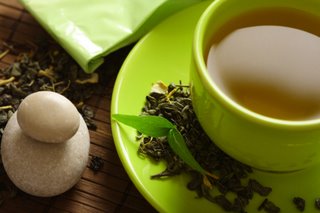 meditative tea ceremony Prepare for Tea During The Winter Season.
In one traditional Japanese tea ceremony, guests are met at the gate by their host and led silently through a garden to the tea room, signifying a departure from the everyday world and an entrance into a spiritual realm.
You probably don’t have a dedicated tea room, but you too can create a space in your afternoon for disconnecting from the day’s stresses, whether you’re at the office or at home. Here’s our simple step-by-step approach to creating your own personal tea ceremony.
Dedicate a Space
This can mean moving to another room, a favorite chair, or just to the other side of your desk — or simply clearing a space for tea on your table or work space. You might consider using a place mat or a tray to visually set your tea space apart from everything else.
Set the Stage
A tea ceremony is about atmosphere. Light a candle or play music to set the mood. If you’re in a busy office, just close your eyes and listen to your breath for a few minutes to switch gears and set the tone.
Select Your Tea.
Bring some intention to your choice. What are you in the mood for? A mild, grassy green? A refreshing peppermint? A rich, vibrant oolong or black tea? As Confucius said, “Let your palate be your guide.”
Use Your Favorite Accoutrements
The personal objects you use for tea making will help make this practice your own. Whether it’s a pretty mug, an iron teapot, or a favorite infuser, using something special for your tea ritual inspires a ceremonial feel.
“The Zen Alarm Clock & Chime Timer’, uses soothing acoustic chimes that signal it’s time – gently and gradually.
Rather than an artificial recorded sound played through a speaker, the Zen Clock features an alloy chime bar similar to a wind chime. When the clock’s alarm is triggered, its chime produces a long-resonating, beautiful acoustic tone reminiscent of a temple gong.
adapted from Body + Sou Magazine, 2005
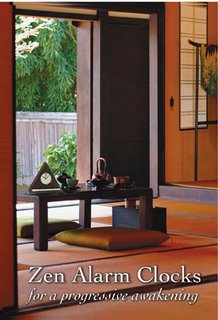 Tea Ceremonies for Relaxation, tea timers with chime by Now & Zen Now & Zen – Chime Timers and Alarm Clocks
1638 Pearl Street
Boulder, CO 80302
(800) 779-6383
Posted in intention, Meditation Timers, Tea Ceremony, Zen Timers
 Brain Aid -- Meditation and Yoga
Science has proven that meditating actually restructures your brain and can train it to concentrate, feel greater compassion, cope with stress, and more.Read the latest research and put it into practice.Yoga citta vritti nirodhah. Yoga is the ending of disturbances of the mind. (Yoga Sutra, I.2)
Nothing is quite as satisfying as a yoga practice that’s filled with movement. Whether you prefer an intense and sweaty vinyasa practice, a gentle but deliberate Viniyoga practice, or something in between, all systems of hatha yoga provide a contented afterglow for the same reason: You sync your movement with your breath. When you do, your mind stops its obsessive churning and begins to slow down. Your attention turns from your endless to-do list toward the rhythm of your breath, and you feel more peaceful than you did before you began your practice.
For many of us, accessing that same settled, contented state is more difficult to do in meditation. It’s not easy to watch the mind reveal its worries, its self-criticism, or its old memories. Meditation requires patience and—even more challenging for most Westerners—time. So, why would you put yourself through the struggle?
Quite simply, meditation can profoundly alter your experience of life. Thousands of years ago the sage Patanjali, who compiled the Yoga Sutra, and the Buddha both promised that meditation could eliminate the suffering caused by an untamed mind. They taught their students to cultivate focused attention, compassion, and joy. And they believed that it was possible to change one’s mental powers and emotional patterns by regularly experiencing meditative states. Those are hefty promises.
But these days, you don’t have to take their word for it. Western scien-tists are testing the wisdom of the masters, using new technology that allows researchers to study how meditation in-fluences the brain.
 Meditating to the rescue
The current findings are exciting enough to encourage even the most resistant yogis to sit down on the cushion: They suggest that meditation—even in small doses—can profoundly influence your experience of the world by remodeling the physical structure of your brain.
Although meditation can be done in almost any context, practitioners usually employ a quiet, tranquil space, a meditation cushion or bench, and some kind of timing device to time the meditation session. Ideally, the more these accoutrements can be integrated the better. Thus, it is conducive to a satisfying meditation practice to have a timer or clock that is tranquil and beautiful. Using a kitchen timer or beeper watch is less than ideal. And it was with these considerations in mind that we designed our digital Zen Alarm Clock and practice timer. This unique “Zen Clock” features a long-resonating acoustic chime that brings the meditation session to a gradual close, preserving the environment of stillness while also acting as an effective time signal.
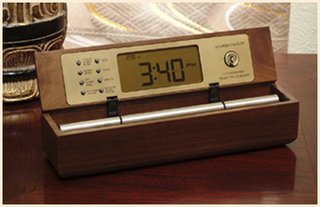 Digital Zen Alarm Clock - A Meditation Timer and Alarm Clock adapted from Yoga Journal, by Kelly McGonigal
Now & Zen’s Meditation Timer Store
1638 Pearl Street
Boulder, CO 80302
(800) 779-6383
Posted in Chime Alarm Clocks, intention, Meditation Timers, Meditation Tools, Well-being, zen, Zen Timers
 Feng Shui Tips If insomnia is a problem, don’t overlook the decor of your bedroom. Indeed, the legendary healer Hazel Parcells (1889-1996) once helped a sleepless client by insisting that she totally redo the room she slept in. “It had been decorated for years in a jungle motif,” says Joseph Dispenza, author of Live Better Longer: The Parcells 7-Step Plan for Health and Longevity (HarperCollins, 1997). “Imitation zebra skin sheets and drapes, wall hangings of monkeys in trees, and all of it set against a background of tropical colors of red, orange, and bright green. ‘There’s your problem,’ said Dr. Parcells, ‘You’re trying to get some sleep while your bedroom is engaged in monkey business all night!'”
Ideally, your bedroom should be restful and not used for anything but sex and sleep. Banish all paperwork and the television to other rooms, keeping clutter to a minimum. “Keep on hand the things you need while in bed but put away everything else,” says Donna Stellhorn, the owner of Moonrise Books in Albuquerque, New Mexico, and an expert in feng shui techniques. “The simpler the better,” she adds.
If that still doesn’t work, consider these tips:
Furniture, plants, and other objects should never loom or hang over the bed; they can threaten your subconscious mind. Plants should also be alive and green, not dry (suggesting death or morbidity) or spiky (threatening).
As for the bed, place it so your head is either facing north or east—experts disagree on which is best—in a spot where you will not be startled if a family member enters. And don’t let junk accumulate under the bed. It can disturb the flow of chi (energy) and affect your sleep.
Color is important. “Best is pale pink, peach, or lavender if you are healthy, but pale green or blue if you’ve been ill or low in energy,” says Stellhorn. Avoid bright colors and busy patterns.
Dr. Parcells also recommended natural—not synthetic—sheets, blankets, and pillows, the right room temperature, good air circulation, and few mirrors, which create cacophonous visual images.
Rather than a loud, buzzing alarm, greet the morning with a Zen Clock with Chime, Tibetan Bowl Clock, chirping birds, relaxing music, an energizing mist of peppermint oil, or a light that brightens gradually to imitate the rising sun.
Boulder, Colorado—an innovative company has taken one of life’s most unpleasant experiences (being startled awake by your alarm clock early Monday morning), and transformed it into something to actually look forward to. “The Zen Alarm Clock,” uses soothing acoustic chimes that awaken users gently and gradually, making waking up a real pleasure.
What makes this gentle awakening experience so exquisite is the sound of the natural acoustic chime, which has been tuned to produce the same tones as the tuning forks used by musical therapists. According to the product’s inventor, Steve McIntosh, “once you experience this way of being gradually awakened with beautiful acoustic tones, no other alarm clock will ever do.”
adapted from Yoga Journal Magazine, by Sally Eauclaire Osborne
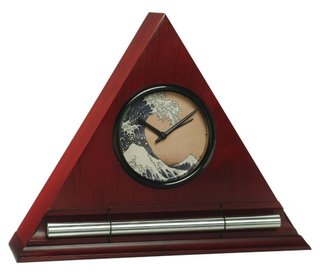 Chime Alarm Clock, a Natural Sound Alarm Clock Now & Zen – The Gentle, Chime Alarm Clock Store
1638 Pearl Street
Boulder, CO 80302
(800) 779-6383
Posted in Feng Shui, sleep, Sleep Habits, wake up alarm clock, Zen Alarm Clock, Zen Timers
« Previous Page — « Previous Entries
Next Entries » — Next Page »
|
|
|
|